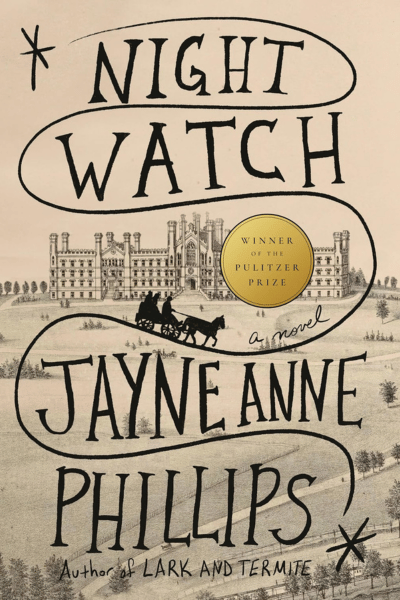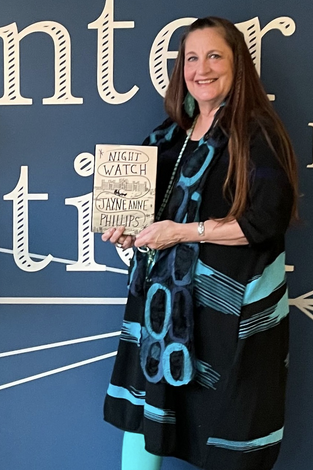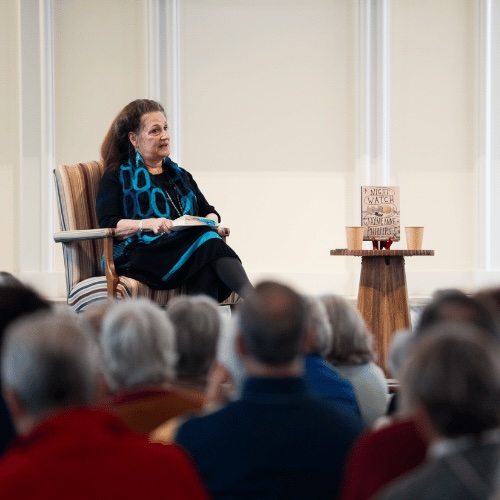 “Jayne Anne Phillips is a once-in-a-generation talent on the page, and I’m happy to share that her distinctive presence comes through in person too. She is able to thread the needle by presenting in a way that satisfies both life-long readers of her work and those who are much newer to it courtesy of the recent Pulitzer Prize nod.” — Club Book, 2024
“Jayne Anne Phillips is a once-in-a-generation talent on the page, and I’m happy to share that her distinctive presence comes through in person too. She is able to thread the needle by presenting in a way that satisfies both life-long readers of her work and those who are much newer to it courtesy of the recent Pulitzer Prize nod.” — Club Book, 2024
 “There is a luminous beauty in Phillips’s prose. Whether it is the dark interiors of war–which have become her forte–or the equally complex and fraught lives of so-called “ordinary” people, Phillips brings these theaters of peace and loss, death and transcendence together with a remarkable alchemy.” — Ken Burns (of Night Watch)
“There is a luminous beauty in Phillips’s prose. Whether it is the dark interiors of war–which have become her forte–or the equally complex and fraught lives of so-called “ordinary” people, Phillips brings these theaters of peace and loss, death and transcendence together with a remarkable alchemy.” — Ken Burns (of Night Watch)
 “Jayne Anne Phillips is a wonderfully gifted storyteller, and few contemporary writers can match the lyricism of her prose, but in this marvelous new novel, largely set in a factual nineteenth-century asylum, she achieves even more: history and imagination merge, and she gives the past a living pulse.” — Ron Rash (of Night Watch)
“Jayne Anne Phillips is a wonderfully gifted storyteller, and few contemporary writers can match the lyricism of her prose, but in this marvelous new novel, largely set in a factual nineteenth-century asylum, she achieves even more: history and imagination merge, and she gives the past a living pulse.” — Ron Rash (of Night Watch)
 “Jayne Anne Phillips is a brilliant artist working at the height of her powers. Word by word, and line by line, there is no one better. This novel lives where a startling imagination meets scrupulous research: Night Watch is a tour de force—breathtaking in both its scope and intensity.” — Tayari Jones, author of An American Marriage
“Jayne Anne Phillips is a brilliant artist working at the height of her powers. Word by word, and line by line, there is no one better. This novel lives where a startling imagination meets scrupulous research: Night Watch is a tour de force—breathtaking in both its scope and intensity.” — Tayari Jones, author of An American Marriage
 “Haunting storytelling and a refreshing look at history . . . Set in West Virginia during and after the Civil War, Phillips’s book takes as given that slavery was evil and the war a necessity, focusing instead on lives torn apart by the conflict and on the period’s surprisingly enlightened approach toward care for the mentally ill. . . . The novel’s pitch-perfect voice belongs to ConaLee, observant and loving but also a scrappy survivor. [Her] lineage, revealed piecemeal, exemplifies a complex world . . . Here the asylum becomes the catalyst for characters to uncover identities lost, hidden, or unknown. . . .Expect coincidences and convolutions, but Phillips’ pulls them off with gorgeous prose, attention to detail, and masterful characters.” — Kirkus, ★ starred review
“Haunting storytelling and a refreshing look at history . . . Set in West Virginia during and after the Civil War, Phillips’s book takes as given that slavery was evil and the war a necessity, focusing instead on lives torn apart by the conflict and on the period’s surprisingly enlightened approach toward care for the mentally ill. . . . The novel’s pitch-perfect voice belongs to ConaLee, observant and loving but also a scrappy survivor. [Her] lineage, revealed piecemeal, exemplifies a complex world . . . Here the asylum becomes the catalyst for characters to uncover identities lost, hidden, or unknown. . . .Expect coincidences and convolutions, but Phillips’ pulls them off with gorgeous prose, attention to detail, and masterful characters.” — Kirkus, ★ starred review
 “Beautiful, mournful . . . Carefully and engrossingly crafted . . . The good suffer equally with the bad. Phillips’s artistic conscience won’t let her flinch from this truth, but her generous heart won’t let it be the last word. She leaves readers with a rueful yet doggedly hopeful maxim that could easily serve as an epigraph for Night Watch as a whole: ‘Endurance was strength.’” — Wendy Smith, The Washington Post
“Beautiful, mournful . . . Carefully and engrossingly crafted . . . The good suffer equally with the bad. Phillips’s artistic conscience won’t let her flinch from this truth, but her generous heart won’t let it be the last word. She leaves readers with a rueful yet doggedly hopeful maxim that could easily serve as an epigraph for Night Watch as a whole: ‘Endurance was strength.’” — Wendy Smith, The Washington Post
 “A story of trauma and restoration in the aftermath of the Civil War . . . Ms. Phillips presents harrowing, visceral scenes of war, but a lot of this novel relates the daily business of convalescence in an asylum, with loving attention given to the motley staff that tends to the unwell . . . The theme of healing extends to the plot. Ms. Phillips, who is drawn to depicting the poor, the mentally disabled, the wounded and other vulnerable souls, is a principled practitioner of narrative magic. Not only serendipity but a kind of clairvoyance connects the characters . . . Goodness is a real thing in this novel—a verifiable force—and the question posed is whether we still have the sensitivity to discern it.” — Sam Sacks, The Wall Street Journal
“A story of trauma and restoration in the aftermath of the Civil War . . . Ms. Phillips presents harrowing, visceral scenes of war, but a lot of this novel relates the daily business of convalescence in an asylum, with loving attention given to the motley staff that tends to the unwell . . . The theme of healing extends to the plot. Ms. Phillips, who is drawn to depicting the poor, the mentally disabled, the wounded and other vulnerable souls, is a principled practitioner of narrative magic. Not only serendipity but a kind of clairvoyance connects the characters . . . Goodness is a real thing in this novel—a verifiable force—and the question posed is whether we still have the sensitivity to discern it.” — Sam Sacks, The Wall Street Journal
 “Phillips is very good at capturing a sort of inner dialect, conveyed here in a language inflected with a Southern twang, modulated to reflect characters’ social status and degree of education . . . It is when Phillips channels [these] thoughts that the telling, like the story itself, becomes [so] compelling, even beautiful.” — Ellen Akins, Minneapolis Star Tribune
“Phillips is very good at capturing a sort of inner dialect, conveyed here in a language inflected with a Southern twang, modulated to reflect characters’ social status and degree of education . . . It is when Phillips channels [these] thoughts that the telling, like the story itself, becomes [so] compelling, even beautiful.” — Ellen Akins, Minneapolis Star Tribune




















